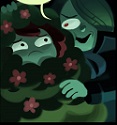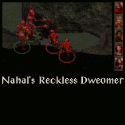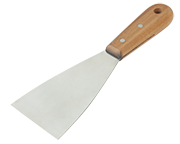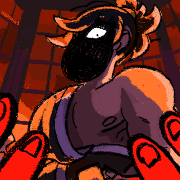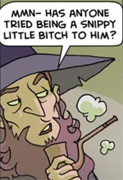|
I ran a year long 13th age campaign and can agree that it was mostly just... ok. Better than playing D&D but still tied down to a lot of dumb sacred cows and half baked doesn't do justice to how weak the Icon stuff was, more like... some raw batter that's sitting cold in the oven because you forgot to turn it on.
|
|
|
|

|
| # ? Apr 28, 2024 15:31 |
|
as the above few posts demonstrate, the worst thing most people think of 13A is that it has too many old dnd standbys that don't need to be there. the reason for the loud hate is that those are mostly tweet's fault, he says so in the sidebars, and he was going to not be on 2e which gave people hope then suddenly he got brought on board
|
|
|
|
PuttyKnife posted:He was an ok dude up until his wife died and he turned part chud. Was he lovely before then? As far as I understand it, Tweet was always conservative but in the "nerdy rear end in a top hat with strong views on atheism" kind of way instead of the Rush Limbaugh way. So you have stuff like him posting about race science, but iirc the actual post was mostly him talking through his thoughts on the subject of race science from first principles and so much could have been avoided if he listened to authorities on the subject and just accepted that race science is nonsense without going through all of it on Facebook. ... But also, even if he wasn't actively conservative I'd be annoyed he's involved in 13th Age 2e, because he's still a nerdy rear end in a top hat and that's why 13 True Ways has lines like "unlike the druid, the monk isn't designed with an eye towards pleasing multiple demographics" after the Monk had a really contentious playtest process where the designers (ie, probably Tweet) refused to give the Monk some really simple buffs. You can argue about how conservative he is, you can't say he isn't a prick.
|
|
|
|
The thing I like most about 13th Age is that it takes almost no effort to make it a lot better. I've come to accept that all D&Ds will be bad in some way, so I don't mind a fixer upper. I read the start of the thread here in TG and took most of the recommendations from there, used one of the more popular icon dice variants, and swapped out the three or four worst classes for some excellent replacements on the official blog. It was really fun. My only regret is that I didn't just go full DTAS, there's a compact variant on the pelgrane blog and it even has nice looking ability-score-free character sheets
|
|
|
|
Silver2195 posted:[*]Most martial classes, while more powerful than in 3e, aren't very interesting. In particular, the dice basically choose which maneuver a Fighter uses instead of the player. Yeah, I was revisiting D&D 4e for something recently and looking at the Ranger and it was like... oh, you can attack twice, and then once per encounter you can attack three times, and once per day you can attack four times! And sometimes you can do less damage but attack reflex instead of AC. And, like, there are some choices there - when to use the powers, who to target, etc... but in terms of powers that actually have interesting effects? Very slim pickings. So if you want a game where you get to do more than just "do your damage" on your turn, you can go with 4e or 13A and pick one of the classes who are allowed to do cool things, or you can go with a game where every class gets cool things. Every class in Strike! gets to do cool poo poo. And same in Tailfeathers, and same in my new project I've recently started... it's the Jimbozig promise: everyone gets to do cool poo poo in combat.
|
|
|
Jimbozig posted:Yeah, I was revisiting D&D 4e for something recently and looking at the Ranger and it was like... oh, you can attack twice, and then once per encounter you can attack three times, and once per day you can attack four times! And sometimes you can do less damage but attack reflex instead of AC.
|
|
|
|
|
Regalingualius posted:I just went and picked up the Avatar the Last Airbender TTRPG from a con. Havenít even opened it up yet, but Iím wondering if folks have any experience with how it plays? Itís surprisingly ambitious and complicated for a licensed game. Itís more or less Powered By The Apocalypse, but has a more in-depth combat system (I havenít read Masks, so I donít know if any of its divergences come from there) with a lot of dice rolling and battle moves arranged in a rock-paper-scissors framework. Thereís not really much of a concept of physical damage either, youíre basically managing your own stamina vs outmaneuvering your opponents, crushing their morale, or convincing them to stop fighting (lot of moves based around sussing out peopleís motivations). Your own motivations and emotions are tracked in pretty fine detail, usually in opposed pairs like Justice vs Mercy which in turn tend to modify your other moves. I played maybe 3-4 sessions and enjoyed it, and feel like it excellently captures the feel of the show, but it takes some getting used to no matter where you fall on the ďtrad vs storygameĒ axis (I guess the game itself is juggling those two axes) and is definitely a very mechanics-forward design.
|
|
|
|
Jimbozig posted:Yeah, I was revisiting D&D 4e for something recently and looking at the Ranger and it was like... oh, you can attack twice, and then once per encounter you can attack three times, and once per day you can attack four times! And sometimes you can do less damage but attack reflex instead of AC. The thing often missed here is that there are people that do not want to do cool but complex operational things in combat; it doesn't interest them even if they are happy others do. One obvious case I can think of is a player in one of my groups who'd been playing since the 70s and more or less alternating between wizard and fighter. When the 4e Elementalist came out he was truly happy with his class for, as far as I can tell, the first time since I'd met him several campaigns earlier. What he wanted from the class was just the one cool thing of setting the world on fire. The wizard's faffing with spells was uncool but let him set the world on fire while the fighter didn't force him to faff but couldn't set the world on fire. Meanwhile the 13A Fighter is almost the worst of all worlds. It's not controlled - and it's not able to do its thing clear of faff. It's a solid NPC class...
|
|
|
|
Doesn't he go by Jonathan X now? 
|
|
|
|
neonchameleon posted:The thing often missed here is that there are people that do not want to do cool but complex operational things in combat; it doesn't interest them even if they are happy others do. One obvious case I can think of is a player in one of my groups who'd been playing since the 70s and more or less alternating between wizard and fighter. When the 4e Elementalist came out he was truly happy with his class for, as far as I can tell, the first time since I'd met him several campaigns earlier. What he wanted from the class was just the one cool thing of setting the world on fire. The wizard's faffing with spells was uncool but let him set the world on fire while the fighter didn't force him to faff but couldn't set the world on fire. half the players in my group fall into this mindset.
|
|
|
|
I like 13th Age a lot but the flaws have by now become very evident and reading the alpha playtest I spotted like 6-7 instances of bits that needed fixing just being entirely unchanged and the whole thing did nothing to get my hopes up.
|
|
|
|
What do people think of as "well-written" campaigns? Regardless of system. I think the two I hear most about are Masks of Nyarlathotep and Griffin Mountain, the latter I think for pioneering the idea of a sandbox setting splatbook (I could be wrong, I haven't run it). I haven't read Masks. I'm one of those people doomed to be forever DM and intermittently trying to run games before life gets in the way. I've always tried to do in person, however, and I've recently decided that virtual gaming definitely seems to be the way forward and feels a lot easier to schedule and plan around, and most of the 'tools' I use while DMing would work better anyway. I often play with people who are new, so frequently I've fallen into the trap of DMing D&D despite not loving it, for the convenience of having prewritten campaign materials to revamp into whatever I want, and because new players in my experience like to start there because it's more familiar. Anyway, I've decided that if I end up playing a module again that's fine, but I'd rather play my homebrew campaign in another system (Mythras). I usually don't prep more than a few sessions at a time, but if I'm not going to lean on D&D I think it could be a good idea to do quite a bit more prep for this campaign, so I'm looking for good examples to see if they give me any ideas for how to structure my prep edit: this probably should have gone in the DMing thread, but oh well
|
|
|
|
My Lovely Horse posted:I like 13th Age a lot but the flaws have by now become very evident and reading the alpha playtest I spotted like 6-7 instances of bits that needed fixing just being entirely unchanged and the whole thing did nothing to get my hopes up. It was enjoyable enough mostly - but that felt like just about the right amount of 13th Age for me. After that long, the thinness of the mechanics started to show.
|
|
|
|
Tosk posted:What do people think of as "well-written" campaigns? Regardless of system. I also liked Beyond the Mountains of Madness, but that's basically the inverse of ICONOCLASTS. The campaign crawls along until you actually get to the mountains, when it briefly opens up before funneling you into the last act. But that moment where you get to explore freely is wonderful, and the revelation at the end is really cool.
|
|
|
|
neonchameleon posted:The thing often missed here is that there are people that do not want to do cool but complex operational things in combat; it doesn't interest them even if they are happy others do. One obvious case I can think of is a player in one of my groups who'd been playing since the 70s and more or less alternating between wizard and fighter. When the 4e Elementalist came out he was truly happy with his class for, as far as I can tell, the first time since I'd met him several campaigns earlier. What he wanted from the class was just the one cool thing of setting the world on fire. The wizard's faffing with spells was uncool but let him set the world on fire while the fighter didn't force him to faff but couldn't set the world on fire. Perhaps the best counterpoints I can think of are a 4E monk I briefly played -- I loved the battlefield control mixed with solid damage (but I did not love being one of five melee characters in a seven character party, so I fairly quickly rerolled into a cleric/invoker hybrid who did damage and forced movement, yet that wasn't as fun) -- as well as a Seeker someone played in that aforementioned Dark Sun campaign. A joke at first, I thought, but lots of faffing about with friendly and enemy positioning plus some decent debuffing IIRC. Sometimes it's fun to face tactical combat puzzles and do nifty things, whether on a grid or in theater of the mind, and sometimes it's fun to turn the brain off and watch number go up. There's something of a theory here that I'm not smart enough to articulate right now, that there's a divide between games that let you create pure combat monsters (D&D, GURPS, Hero/Champions) and games that allow you at best to make a combat-intensive yet more-rounded character (FATE, Star Trek Adventures).
|
|
|
|
neonchameleon posted:The thing often missed here is that there are people that do not want to do cool but complex operational things in combat; it doesn't interest them even if they are happy others do. One obvious case I can think of is a player in one of my groups who'd been playing since the 70s and more or less alternating between wizard and fighter. When the 4e Elementalist came out he was truly happy with his class for, as far as I can tell, the first time since I'd met him several campaigns earlier. What he wanted from the class was just the one cool thing of setting the world on fire. The wizard's faffing with spells was uncool but let him set the world on fire while the fighter didn't force him to faff but couldn't set the world on fire. Sure, but I think most of the time when people are unhappy with the I Just Attack class it's for a couple of reasons that aren't just "simple classes shouldn't exist": 1. The simple class disproportionately ends up being the fighter or its equivalent. The Elementalist is a good counter example and it would be nice to see more games acknowledge that wanting a simple class doesn't mean you only want to play one type of character 2. The simple version of a class is the only version of that archetype. I was unhappy with the 5E fighter but I would have been absolutely fine with it if there was another martial class in the book that felt like an evolution of the 4e fighter. There were still complex caster options for the other players in your Elementalist friend's group
|
|
|
|
Lurks With Wolves posted:13th Age still has a lot of good points. The 13th Age Bestiary is a really good monster manual. It's got deep dives on 40 monsters, mostly D&D classics, with well thought out options for how they can work in your game. I counted about 350 plot hooks across all 40 monsters. There's a preview with the orc, white dragon, and the naga available for free, https://preview.drivethrurpg.com/en/product/123782/13th-age-bestiary-preview
|
|
|
|
Tosk posted:What do people think of as "well-written" campaigns? Regardless of system. I think the two I hear most about are Masks of Nyarlathotep and Griffin Mountain, the latter I think for pioneering the idea of a sandbox setting splatbook (I could be wrong, I haven't run it). I haven't read Masks. Here's a couple of threads with solid recommendations for starters: https://www.reddit.com/r/rpg/comments/abuhf1/the_best_premade_campaigns/ https://www.reddit.com/r/rpg/comments/18q0lvb/any_good_recent_published_campaigns/ If you want ideas for making your own scenarios for Mythras, you might want to look at some good OSR stuff. Bryce Lynch is a prolific reviewer of such and the books he marks as Best Of are usually very good: https://tenfootpole.org/ironspike/?cat=7
|
|
|
|
4E's ranger (most builds) and fighter (some builds) were good ways to combine the general gameplay idea of "I'm just here to make the red bar over the bad guy's head shrink as fast as possible" with the 4e design principle of giving everyone equal amounts of equally-important resources to spend. It's like the difference between a Vampire character who puts all three of their starting dots into Vigor (which just gives them a passive strength boost, and the option to pay vitae for a bigger active damage boost) or who puts all three of their starting dots into Dominate (which gives them a series of interdependent special powers that require special dice rolls to activate and saddle specific status effects on their targets that later powers can interact with). These are sort of 4E fighter vs. 4E wizard archetypes, where one guy's power set is a lot more varied and complicated than the other but both guys have vitae and willpower to spend and are both playing around in the same basic economy. What 4E essentials should've done with fighters is keep the AEDU power divide, but laid out more fighter powers of the "just activate this on-hit to add a damage boost" model and maybe even allow those powers to be a stack of a single, generic, repeatable boost rather than a spread of distinct maneuvers. Like, in addition to the per-encounter power strike there'd be an even bigger daily superpower strike and that's that. Similarly, the 4E elementalist should've had a daily power that's just elemental escalation+++.
|
|
|
|
neonchameleon posted:The thing often missed here is that there are people that do not want to do cool but complex operational things in combat; it doesn't interest them even if they are happy others do. One obvious case I can think of is a player in one of my groups who'd been playing since the 70s and more or less alternating between wizard and fighter. When the 4e Elementalist came out he was truly happy with his class for, as far as I can tell, the first time since I'd met him several campaigns earlier. What he wanted from the class was just the one cool thing of setting the world on fire. The wizard's faffing with spells was uncool but let him set the world on fire while the fighter didn't force him to faff but couldn't set the world on fire. I don't think that's a thing I missed so much as - like you point out - a whole separate axis. There's the "able to do cool poo poo" axis, where I believe every class should be able to hit the high end, and then there's the "is fiddly/challenging" axis where I think there should be a range of options available. Like, in Strike and Tailfeathers both there are some classes that are simpler for people who like that and some that are more complex for people who like to faff about (like me). Sometimes it's possible to make a class where you can get a good spread of options within that class (e.g. one class feature that is simple and one that is complex), but that's not always totally possible within the bounds of the class' main mechanical idea - it's easier to add a complex feature to a simple class than to use a feature to simplify a class that has a complex core. I wouldn't say that any character in Strike is quite as simple as a D&D fighter - that's too far from Strike's "sweet spot" but there are definitely characters where you can just pick the powers that have the least words and use them to smash things. Tarnop posted:2. The simple version of a class is the only version of that archetype. I was unhappy with the 5E fighter but I would have been absolutely fine with it if there was another martial class in the book that felt like an evolution of the 4e fighter. There were still complex caster options for the other players in your Elementalist friend's group
|
|
|
|
Actually, I know of a group where they helped the casual player build an archer Ranger, thinking that was easy enough to manage, but a few levels in she'd get overwhelmed with options and just do Twin Strike every round. My best friend got exasperated playing a Cleric and much preferred the Slayer, but part of that was getting terrible advice from someone else in the group. I think there's some kind of grand conspiracy devoted to teaching first-time 4e players to make a Balanced Cleric. Stop it!
|
|
|
|
Ferrinus posted:4E's ranger (most builds) and fighter (some builds) were good ways to combine the general gameplay idea of "I'm just here to make the red bar over the bad guy's head shrink as fast as possible" with the 4e design principle of giving everyone equal amounts of equally-important resources to spend. It's like the difference between a Vampire character who puts all three of their starting dots into Vigor (which just gives them a passive strength boost, and the option to pay vitae for a bigger active damage boost) or who puts all three of their starting dots into Dominate (which gives them a series of interdependent special powers that require special dice rolls to activate and saddle specific status effects on their targets that later powers can interact with). These are sort of 4E fighter vs. 4E wizard archetypes, where one guy's power set is a lot more varied and complicated than the other but both guys have vitae and willpower to spend and are both playing around in the same basic economy. Keeping with the idea of "same basic economy," everyone's ability to contribute to non-combat encounters in 4e is normalized via skill challenges, too, so everyone's still rolling a d20 + mods to solve problems, instead of letting the wizard wave their hand and spend a trivial spell slot to outdo the rogue's job. (I mean yes, the wizard can still do that, but the spell slot cost is less trivial, they still have to roll, and their contributions are only equal and not better.) Simple characters and combat monsters aren't really any worse at Doing Stuff that isn't making hit points go down, and the best feats for combat (i.e. multiclass feats) even make you better at noncombat stuff too, by giving you an extra skill training to work with. Turns out you solve a lot of problems by forcing people to roll skill checks to do things covered by skills!
|
|
|
|
Jimbozig posted:This is why I love it when I can get the simple mode and complex mode to fit into one class. Like when you can play the tactical positioning archer with powers like suppressing fire, or you can play the "make lots of feathers stick out of the bad guy" archer depending on your choices. I am, in fact, the "simple classes shouldn't exist" guy, but if I had to stake out a compromise position this solution is much better than relegating an entire class to the niche.
|
|
|
|
Personally, i'm "simple games shouldn't exist" in my stance on games.
|
|
|
|
Tosk posted:What do people think of as "well-written" campaigns? Regardless of system. I think the two I hear most about are Masks of Nyarlathotep and Griffin Mountain, the latter I think for pioneering the idea of a sandbox setting splatbook (I could be wrong, I haven't run it). I haven't read Masks. You're looking for Eyes of the Stone Thief by Gareth Ryder-Hanrahan. It's a mega-dungeon but also a campaign involving travel across the world (and to other planes?). It's modular and allows for a lot of GM personal-expression, but also gives you so much to work with. It's designed to allow the GM (and even the same players) to run the campaign again. I feel like it's one of the gold standards for a campaign. Top Ten, definitely. I can't wait to see what he does with Heart.
|
|
|
|
CitizenKeen posted:You're looking for Eyes of the Stone Thief by Gareth Ryder-Hanrahan. It's a mega-dungeon but also a campaign involving travel across the world (and to other planes?). It's modular and allows for a lot of GM personal-expression, but also gives you so much to work with. It's designed to allow the GM (and even the same players) to run the campaign again. I'm a ridiculous fanboy for GRH, I'll buy and consider running everything he produces. His Traveller stuff is great too.
|
|
|
|
sebmojo posted:I'm a ridiculous fanboy for GRH, I'll buy and consider running everything he produces. His Traveller stuff is great too. Agreed. He made 13th Age weird, so I assume his campaign for Heart is going to be absolutely insane.
|
|
|
|
Jimbozig posted:Yeah, I was revisiting D&D 4e for something recently and looking at the Ranger and it was like... oh, you can attack twice, and then once per encounter you can attack three times, and once per day you can attack four times! And sometimes you can do less damage but attack reflex instead of AC. 1) In 4E dealing damage is actually useful, and being able to attack any two targets within range is very useful in a game with minions. "dead" is the most interesting effect. 2) They also get a rakeloads of shifts and other movement powers, or a bunch of utilities that can grant skill bonuses to allies etc if you want something alittle more OOC. 3) There's a random grab bag of other stuff like slows, reducing AC and such, all in the base PHB.
|
|
|
|
mllaneza posted:The 13th Age Bestiary is a really good monster manual. It's got deep dives on 40 monsters, mostly D&D classics, with well thought out options for how they can work in your game. I counted about 350 plot hooks across all 40 monsters. I ran two fairly long campaigns of 13th age (including one on here) and two things I loved about it as a GM and particularly the two bestiaries (plus the monsters in the main book) was the monsters all had interesting different defined roles to plug in. so making a varied combat was very easy (a caster boss, a couple archers, a wrecker to add some status effects and some defenders to guard the archers for example) Also, the system for stepping up/down monster levels and building combats was super easy. I could pretty easily guestimate a combat just about every time where I could make the fight easy, tough or hard without it being too easy or fearing overwhelming/TPK. I really dislike making combats in 5e, it's a pain to raise monsters CR, I'm always afraid of accidently TPKing a party because I'm not sure how much over "Deadly" is going to TPK them, and anything under Deadly is apparently generally much too easy.
|
|
|
|
Tosk posted:What do people think of as "well-written" campaigns? Regardless of system. I think the two I hear most about are Masks of Nyarlathotep and Griffin Mountain, the latter I think for pioneering the idea of a sandbox setting splatbook (I could be wrong, I haven't run it). I haven't read Masks. Dracula Dossier is the gold standard for sandboxy campaign play, and also has maybe the best handout / prop in all of RPG history.
|
|
|
|
Halloween Jack posted:Actually, I know of a group where they helped the casual player build an archer Ranger, thinking that was easy enough to manage, but a few levels in she'd get overwhelmed with options and just do Twin Strike every round. Honestly, Twin Strike trumps an outrageous amount of the available encounter powers, to the point that someone struggling to decide between them, and developing the mental shortcut that Twin Strike is always a reasonable thing to use, doesn't surprise me. A player that doesn't like making a decision about which is "the right" power on their turn is IMO served very well with the reactions and interrupts in the roster. They keep the player engaged and watching out for trigger conditions, but they don't have to weigh options so much. The fact that twin strike trumps a lot of higher costed powers, on the other hand, is a bit of a design flub. 4e also has a crazy high ceiling on how fiddly you want your character to be. Even a ranger that just makes very plain attacks can staple on some wild effects via gear and talents, sliding, proning or worse. I've seen rangers with flails, bolas or nets, adding a lot of control to the repertoire.
|
|
|
|
Kestral posted:Dracula Dossier is the gold standard for sandboxy campaign play, and also has maybe the best handout / prop in all of RPG history. That book is so incredible.
|
|
|
|
Kestral posted:Dracula Dossier is the gold standard for sandboxy campaign play, and also has maybe the best handout / prop in all of RPG history. Checks author mmhmm He also did a neat campaign for weird little fate sci fi game Bulldogs, where you fight psychic space Nazis
|
|
|
|
Tosk posted:What do people think of as "well-written" campaigns? Regardless of system. I think the two I hear most about are Masks of Nyarlathotep and Griffin Mountain, the latter I think for pioneering the idea of a sandbox setting splatbook (I could be wrong, I haven't run it). I haven't read Masks. Masks is dense with plot and NPCs. I've only run a portion (South America and New York) and it was a lot to keep up with. It was kinda exhausting to run with a lot of jumping around the book during play. The scope of the campaign is awesome though and it has great props. I would probably slim it down if I run it again. The other one that really stood out, and my favorite thing I've ever ran, was Way of the Wicked. That's an evil campaign for Pathfinder. I ran it in 5e. Turns a lot of tropes around - the PCs at one point run a dungeon that lures in adventurers, they fight paladins and unicorns, they recruit monsters to their side. There are side quests where you play an expendable minion and do missions for your own PCs (ok level 0 cultists, I command you to capture the hydra in that cave). And it had good advice on keeping a group of villains together without things going too off the rails.
|
|
|
|
Kestral posted:Dracula Dossier is the gold standard for sandboxy campaign play, and also has maybe the best handout / prop in all of RPG history. Also by Hanrahan!
|
|
|
|
Kestral posted:Dracula Dossier is the gold standard for sandboxy campaign play, and also has maybe the best handout / prop in all of RPG history. For me itís Dead Gods which is Monte Cook but I think maybe it can come across as too on rails.
|
|
|
|
I'm fine with a "simple" class if they can actually be on par with everyone else. I'm playing a pure Heroic Warrior in a Worlds Without Numbers game because I haven't played the system before and my abilities are very simple and are basically "be good at fighting." As we've leveled up I've gained more combat abilities through talents I pick up which add a bit more to keep track of but nothing too major. The thing is my character very, very, very good at it - the rest of the party has various supernatural abilities and spells that let them do a bunch of unique things but none of them can really match his ability to just kill people.
|
|
|
|
Splicer posted:That's a little unfair for a few reasons. The saying is "dead is the most useful status" not the most interesting. Obviously being able to pump out lots of attacks is useful, and rangers were very effective in 4e. Like I said, you get to choose where to point your big firehose of damage, and there are some tactical decisions there. But that's not the same as having cool effects. I'm going to go through the PHB up to level 5 and list the combat effects they get: Level 1: -shift -daily slowed and ongoing damage or daily weakened Level 3: -push Level 5: -daily dazed or -2 to attack rolls That's it. Aside from their rare daily uses, they can only get shifts and one push. Everything else is just accuracy and damage bonuses and extra attacks. I'm not saying they're not fun or not effective. They are those things! I'm saying they don't get cool and interesting effects, and that's just an objective fact. Compare to wizards. Or not even! Compare to another Martial Striker, the Rogue. Rogues get a larger variety of effects available to them. They can potentially do more things. This is kind of orthogonal to the "simple class" thing because you could absolutely have a class that is very complicated and finicky and all they do is move and attack, but you need to line up the moves and attacks in specific ways to get various damage and accuracy bonuses. It could be complicated and a fun interesting challenge to play without having any interesting/cool effects at all.
|
|
|
|
I don't understand why the 4E ranger wasn't a martial controller. Rain of Arrows, pinning shot etc would have made them really cool. The rogue was already a martial striker, and having a martial controller would have allowed you to have an all martial party that filled all the roles.
|
|
|
|

|
| # ? Apr 28, 2024 15:31 |
|
mellonbread posted:I really liked ICONOCLASTS for Delta Green. It's got a strong intro, it's the only official scenario for the standalone edition that really feels like an investigation, and it gives a lot of mechanics room to breathe which don't normally come up in scenarios. It's not that long either, which I think is a good thing. Speaking of Iconoclasts, how well do you think it links up with the Kali Ghati scenario? Obviously it's different, but I'm wondering about potentially starting with KG as a "one quick job" situation that inadvertently leads into the whole Iconoclasts debacle, due to the agents being nearby
|
|
|




































